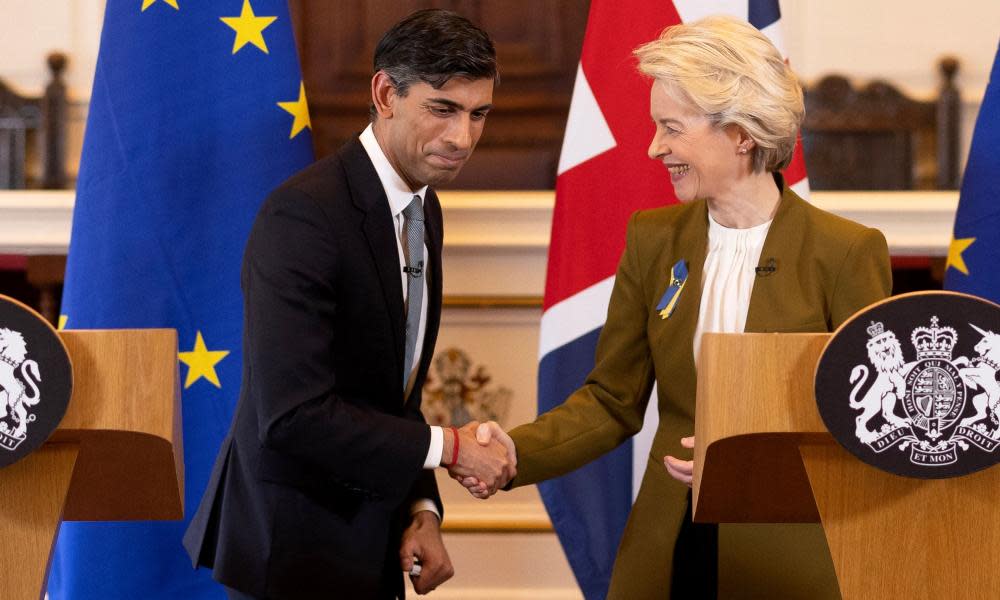Brexit will endure after Sunak’s deal, but Brexitism is dying and Johnsonism may be dead

Brexit is done and also it will never be done. Rishi Sunak’s deal to fix the Northern Ireland protocol ends a process that is only beginning. If that sounds paradoxical it is because British politics uses the B-word to describe many things, or rather it confuses different things by pretending they are one.
Brexit was an insurrection against the status quo and a promise to upend the established ways of Westminster government. But Brexit is also a technical project and a diplomatic minefield that can’t be navigated without those old skills of establishment statecraft.
Sunak voted leave in 2016, but he was not a devotee of the vandal cult that can only see a glowing future for Britain when bridges to Europe are burning. He was a hobbyist Eurosceptic backbencher who got mugged by economic reality when he became chancellor. It is impossible to sit in the Treasury without coming to a rational understanding that the national interest demands harmonious relations with Brussels.
Selling his deal yesterday, Sunak even boasted that Northern Ireland enjoyed a “very special position” in the EU single market, and that this privilege made it a magnet for investment. By celebrating the residual benefit of membership for one nation of the United Kingdom, he concedes the cost incurred by exclusion of the other three.
This is the bitter contradiction and the absurdity that has defined British politics since the referendum. The only way to handle Brexit without economic arson and diplomatic isolation is to think like a remainer.
It was a point made unsubtly by Ursula von der Leyen, the European Commission president, when she attributed the breakthrough in talks to “honesty” and “goodwill” made possible by “a constructive attitude from the very beginning”. The beginning, that is, of the Sunakian era, in contrast to the age of Johnson (and the brief tribulation of Truss).
Von der Leyen’s praise for “dear Rishi” would once have been poison in Conservative ears – proof that the prime minister had been captured. Brexit, in its most ideological conception, is a zero-sum game in which the European Commission is only happy if Britain has been diddled out of sovereignty.
That attitude still prevails among many Tory MPs but it competes with fatigue and an instinct for electoral self-preservation. There is no appetite among voters for the re-enactment of Brexit wars, especially when the terrain of battle is so small – a scrap of European court jurisdiction under a mound of procedural safeguards in Northern Ireland.
Some Tories have committed themselves so completely to the sovereignty crusade that they find it hard to imagine life without the struggle. Others are hooked on the media limelight that falls on self-appointed arbiters of Brexit virtue. In what other field could David Frost or Jacob Rees-Mogg have risen to be men of consequence?
But even the fundamentalists have been disoriented by the quality of concession that Sunak won for his “Windsor framework”. The “Stormont brake” allows for a unilateral UK halt to the application of European regulation in Northern Ireland. It is a complex trigger, carefully designed to resist pulling by itchy Eurosceptic fingers, but it is still a departure from previous EU positions. It rewards the expectation of proportionality and good faith in future relations that Sunak brought to the table. It is the trust dividend, and a repudiation of the Johnson school of negotiation, according to which Europeans only yield to swagger and threat.
In making the case for engagement and compromise, Sunak finds himself in closer alignment with Keir Starmer than with his two Tory predecessors. Both leaders have an interest in Brexit drifting to the margins of political debate, as a matter of boring consensus. Any discussion of Europe brings the Tories out in a rash of division and disloyalty. There is no Brexit position that can satisfy Labour’s liberal remainer base without repelling the leave voters on whom a majority depends. So Starmer and Sunak collude in the fiction that, this time, Brexit really is done.
In reality, the benefit of the new framework consists in resetting relations for rolling talks to tie up loose ends on all kinds of issues – energy, fish, financial services, electric cars, chemicals. The whole edifice of trade cooperation is up for review in 2025.
Brexit as management of a relationship is, by definition, never done. But Brexitism as the doctrine of national renaissance through conflict with Brussels is dying.
That is a victory for Sunak, but it’s not bad for Starmer either if it helps to establish the superiority of managerial pragmatism over pyrotechnic charisma as the mark of a good prime minister.
This is something else the Labour leader and his Tory counterpart have in common. They are both planning election pitches that dial down ideology and sideline the cranks who, until recently, set their respective parties’ agendas.
It is easier for Starmer with a double-digit lead in opinion polls. Sight of victory breeds message discipline, even among Labour MPs who couldn’t say for sure what the message is, while expectation of defeat has the opposite effect on Tories.
The weaker the party’s prospects, the less inclined it feels to put in the hard yards of grown-up government, which is its only chance of rehabilitation. Sunak has shown how it works in negotiations with Brussels. But of all the conceivable treatments that is the bitterest pill for Conservatives to swallow. If trust and diplomacy are the ingredients of a good deal, if the national economic interest is served by closer relations with Europe, the road to getting Brexit done starts to look more like the long, arduous process of undoing Brexit.
Rafael Behr is a Guardian columnist

 Yahoo News
Yahoo News 
